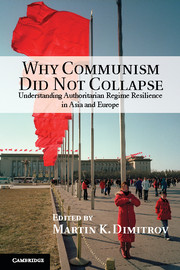Book contents
- Frontmatter
- Contents
- Tables and Figures
- List of Contributors
- Acknowledgments
- Abbreviations
- Part I Reform and Resilience
- 1 Understanding Communist Collapse and Resilience
- 2 Resilience and Collapse in China and the Soviet Union
- Part II Ideology and Resilience
- Part III Contagion and Resilience
- Part IV Inclusion and Resilience
- Part V Accountability and Resilience
- Miscellaneous Bibliography
- General Bibliography
- Index
- References
2 - Resilience and Collapse in China and the Soviet Union
Published online by Cambridge University Press: 05 August 2013
- Frontmatter
- Contents
- Tables and Figures
- List of Contributors
- Acknowledgments
- Abbreviations
- Part I Reform and Resilience
- 1 Understanding Communist Collapse and Resilience
- 2 Resilience and Collapse in China and the Soviet Union
- Part II Ideology and Resilience
- Part III Contagion and Resilience
- Part IV Inclusion and Resilience
- Part V Accountability and Resilience
- Miscellaneous Bibliography
- General Bibliography
- Index
- References
Summary
INTRODUCTION
The Soviet Union and China represent the largest and most strikingly different cases of communist resilience and collapse. In both countries, new leaders, Deng Xiaoping in 1978 and Mikhail Gorbachev in 1985, rose to power, having inherited crises of varying dimensions. Both leaders were determined to revitalize and reinvigorate the ruling parties and redirect their peoples’ energies in new, more productive directions. The Soviet regime failed; its transformative quest unleashed forces that led to the end of communist party rule, the partition of the USSR into its fifteen constituent union republics, and the loss of its superpower status. In contrast, Deng Xiaoping and his successors succeeded in transforming China into a world-class economic and rising military power by maintaining a remarkable growth rate averaging 10 percent for thirty years. Extraordinary social, economic, and cultural transformations took place. Communist rule survived, showing a remarkable capacity to adapt to new circumstances.
This chapter offers four explanations for these drastically different outcomes. The periods covered are 1985–1991 in the Soviet Union and 1978–1992 in China. First, collapse and resilience were largely due to decisions by leaders and their anticipated and unanticipated consequences. The most important difference in the roles of leaders pertains to Gorbachev’s support of political liberalization and Deng Xiaoping’s decision to suppress it. Political liberalization refers to the opening up of a dictatorship to free political participation, media, and the right to organize autonomous political groups. In the Soviet case, it was closely linked to democratization, meaning competitive elections in party and state. In sharp contrast, China’s dominant leader, Deng Xiaoping, restricted political reforms to repairing the damage suffered by political institutions during Mao Zedong’s Cultural Revolution and adapting authoritarian rule to the requirements of a modern state and of the gradually emerging market economy. The Chinese Communist Party’s (CCP’s) monopoly of power was preserved. Fending off demands for political liberalization has enabled the CCP to maintain its monopoly to this day.
Information
- Type
- Chapter
- Information
- Why Communism Did Not CollapseUnderstanding Authoritarian Regime Resilience in Asia and Europe, pp. 40 - 64Publisher: Cambridge University PressPrint publication year: 2013
References
Accessibility standard: Unknown
Why this information is here
This section outlines the accessibility features of this content - including support for screen readers, full keyboard navigation and high-contrast display options. This may not be relevant for you.Accessibility Information
- 5
- Cited by
